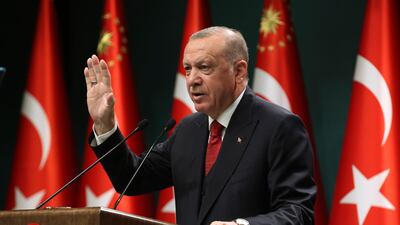The US ambassador to Turkey, David Satterfield, on Wednesday warned Ankara that American pharmaceutical companies could abandon it if Turkey did not pay its debt.
Speaking at the US-Turkey Business Council, Mr Satterfield said Turkey’s debt to US pharmaceutical companies increased from $230 million to $2.3 billion in the past year and was damaging the relationship.
“Companies will consider departing the Turkish market or will reduce exposure to Turkish market," he said. "This is not a direction that serves the interests of Turkey."
Describing it as a “significant issue”, Mr Satterfield said there would be consequences if the issue were not settled.
“There will be a consequence to non-payment of debt or to demands that companies accept a reduction in the total for equipment and services provided,” he said.
Mr Satterfield urged that the issue be addressed promptly.
He said US Secretary of Commerce Wilbur Ross was given assurances by President Recep Tayyip Erdogan last year that the debt would be paid.
Mr Ross visited Turkey last September in hopes of reaching a $100bn trade deal.
Aykan Erdemir, senior director of the Turkey programme at the Foundation for Defence of Democracies, said the pharmaceutical debt issue was another sign of Turkey’s economic woes.
"This payment crisis is yet another sign of the deepening troubles in Turkey's public finances," Mr Erdemir, a former Turkish parliamentarian, told The National.
"Earlier this year, Turkey’s central bank depleted its foreign currency reserves, excluding swap deals, and experts have been warning about a balance-of-payments crisis.
“This state of affairs is particularly embarrassing for Mr Erdogan, since his son-in-law Berat Albayrak happens to be at the helm as the Minister of Finance and Treasury during the worst economic downturn in Turkish history."
Mr Ross met Mr Albayrak on his visit last year and received assurances that Turkey would pay its dues.
The tenfold increase in debt is also attributed to the depreciation of the Turkish lira, Mr Erdemir said.
“Given the Turkish lira’s 25 per cent depreciation against the US dollar over the past 12 months, the total amount in arrears has skyrocketed in lira terms,” he said.
Mr Erdemir indicated that the Turkish government was trying to force companies to accept up to 30 per cent reductions in the amount owed.
But there is no suggestion that US companies would accept such a compromise.
US President Donald Trump is known to have a direct line to Mr Erdogan, who he called in the past a “great ally” and said he was a “big fan” of him.
But the US-Turkey relationship has suffered in the past year as Ankara bought and received a Russian S-400 defence missile system in July 2019.
The move brought penalties from the US, which removed Turkey from the F-35 fighter jet consortium and cancelled Ankara’s purchases.


